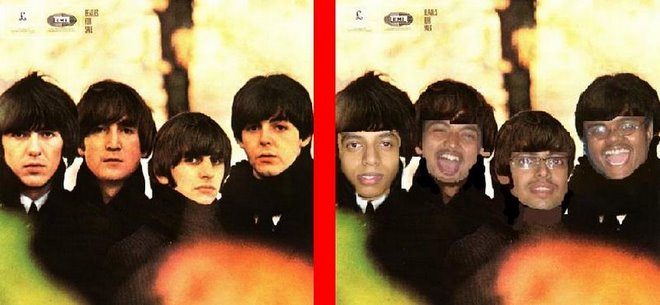Before hyperlinking to the depths of philosophic intrigue, here is what compelled me to write on this...:
-----
Snopes is a handy reference in today's indiscriminate forwarding day and age. So while we all know that we won't quite find the love of our lives if we send the link to this blog post:
-> to 20+ people, then within 24 hours
-> to 10+ people, then within 24 days
-> to 5+ people, then within 24 weeks
-> to 5- people, then within 24 months
-> to nobody, then never ever ever, and cursed to an existence of eternal remorse, sorrow and loneliness,
It does tickle the curiosity bone/vein/thingus when one reads about perpetual motion machines, exploding cola cocktails et al.
SO, its generally nice to have "Urban Legends Reference Pages" handy, to kill free (and otherwise as well!) time, and verify on the latest scoop delivered unsolicited to your inbox.
Now, without caring to verify the veracity of the contents of the following link, I shall take the liberty to write on anyway.
http://xkcd.com/250/
-----
So, Quis custodiet ipsos custodes?
Who shall guard the guards?
It is a question with an infinite appetite for recursion (this is for the uninitiated amongst us).
This fundamental query has formed the basis of umpteen plots of creative human expression (CHE, is my shorthand for all forms of art, human endeavour, et al. So it includes movies, music, theatre, management, programming, literature, poetry, et al et al et AL).
Practical examples of this insanely incorrigible phenomenon exist, in abundance.
1. The first 44 years of our independence. In economic (and perhaps others as well) terms, it certainly was a silent massacre. With the state hell bent on "taking care of the people", through its 'socialist' measures, industry controls, nationalizations left right and centre, business xenophobia et al, it didn't take too long for the machinery to grow bigger than the product.
The years of smug administrative complacency fed the monstrous sloth that is defined by its layers of red tape.
And as all other monsters, this too needs its feed. And thus came the notoriously generic and vague, "corruption". License Raj, Inspector Raj, and other such gifts from our predecessors meant that every level of control could be leveraged for optimal monetization of the people's hopes and aspirations.
The state defined what was good for "special" industries, thus curtailing the potential of the companies that stood any chance of competing at the global level (curiously barring Reliance one might say, but the struggles there too were no less Herculean).
The limitations led to under-utilization of infrastructure, capacity and talent. Indeed, the mama-papa government felt it best to guide each step of its beloved children, right from infancy to impending death.
Was there any way, for the state to have been watched over, by a mysteriously noble, far-sighted, honest and downright pure eye?
I shall not comment on how much has changed post-1991, but one can optimistically say that things finally ARE on the move. RTI, (though often stalled) reforms, increased public activism are some of the factors that instill a faint sense of hope within.
2. Communism in Russia. Enough said.
3. The UN. With the UN fast becoming a mouthpiece for the US, a teeth-less implementor of floating rules and regulations, who shall watch over the proper and effective functionings of the watcher over of world affairs?
And the list can really go on...
Upon some thought and random browsing, Free Markets ({Capitalism ahoy!} {Profit (really) is NOT a dirty word!}) emerge as a possible solution to the problem. Trusting the Invisible Hand seems to be the only alternative. However, leaving the public at the hands of a COMPLETELY free market might lead to dangers of cartels and other such.
This leads us to the somewhat paradoxical option, of a "regulated free market", as is the case in general these days. A free market situation, with the bare minimum levels of answerability to an independent body, to prevent blatant public exploitation.
However, I see I have digressed from the original question to one example that lives the conundrum.
As of now, I have no answers to THE question. Shall update, upon future epiphanies and interactions.
Till then, all aboard the HMS Regulated Capitalism!
PS: In case you're asking yourself if this post was finally economic or philosophic in nature, I'd ask you the difference between the two.
The underlying unity of all CHEs... Sigh, thats enough for another post, another day, another lifetime! :)
PPS: Quick add-in!
Josef Ackermann (chief executive of Deutsche Bank): “I no longer believe in the market’s self-healing power”.
Hmmm... Interesting.
(Link via)
Subscribe to:
Post Comments (Atom)
Copyright

These works by Anand Justin Cherian are licensed under a Creative Commons Attribution-Non-Commercial-Share Alike 2.5 India License.
Cheers to South Park!
Q. - While people will always act within the bounds of human nature -- good people being good and bad people being bad, it takes religion to make good people bad.
A. - "Well, many religions also give people good reasons NOT to do bad things. And while people may do terrible things in the name of religion or via religion, they may have well still done them without the religion there -- it's just a justification provided for a choice already made."
-- Matt Stone & Trey Parker
(From South Park FAQ's)
Bet you didn't expect THIS from the ones who made Cartman and the gang! :)
A. - "Well, many religions also give people good reasons NOT to do bad things. And while people may do terrible things in the name of religion or via religion, they may have well still done them without the religion there -- it's just a justification provided for a choice already made."
-- Matt Stone & Trey Parker
(From South Park FAQ's)
Bet you didn't expect THIS from the ones who made Cartman and the gang! :)
Dilbert
Beatlemania!!!

No comments:
Post a Comment